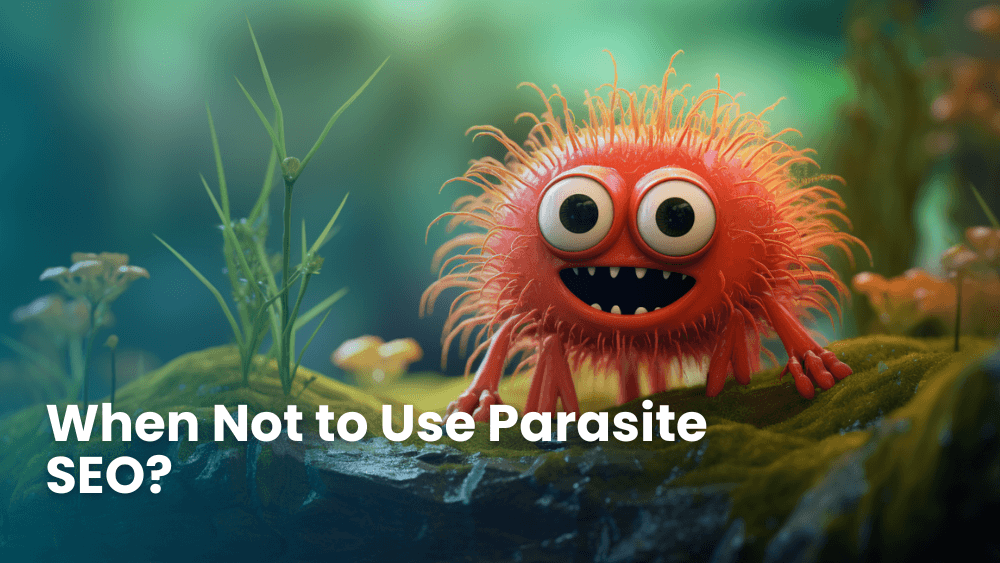Parasite SEO is a unique strategy in the digital marketing landscape, wherein marketers leverage high authority external websites to rank their own content higher in search results. It’s a technique that’s particularly beneficial for Digital Marketing Agencies, Small Businesses, and SEO Experts looking to gain a competitive edge. In this comprehensive guide, we will delve deep into the world of Parasite SEO and explore how it can be a game-changer in 2023.
Key Takeaways
- Understand the core benefits of Parasite SEO for high-quality optimization.
- Learn the ideal scenarios for implementing Parasite SEO strategies.
- Get insights into the distinctions between White Hat and Black Hat SEO techniques in Parasite SEO.
What is Parasite SEO?
Parasite SEO involves creating content on high authority websites and optimizing it for search engine rankings. Unlike traditional SEO where you focus on optimizing your own website, Parasite SEO leverages the high domain authority of other platforms to rank content more quickly and effectively.
These are websites that have built up substantial credibility, traffic, and recognition over the years. Examples include social media platforms like LinkedIn, educational platforms like Wikipedia, and media sharing platforms like YouTube.
By publishing content on these platforms and optimizing it for specific keywords, you can often achieve higher rankings more quickly than you could with a low-authority site. The high DA of these platforms essentially boosts your content in the eyes of search engine algorithms, effectively providing you with a shortcut to higher visibility.
Examples:
- YouTube Videos: Creating a video that is optimized for your targeted keywords and uploading it to YouTube can often rank faster than a blog post on your own website.
- LinkedIn Articles: If you publish a well-optimized article on LinkedIn, it can rank highly for targeted keywords due to LinkedIn’s high domain authority.
- Guest Posts on High DA Blogs: Writing a guest post on a blog with high domain authority can also help you rank for your desired keywords. The blog post can link back to your own website, driving high-quality, targeted traffic.
Why the Term “Parasite”?
The term “Parasite” is used because this SEO strategy essentially “leeches” off the authority and trust that established websites have built over time. Just like a parasite gains nutrients from its host, Parasite SEO benefits from the domain authority of host websites.

Does Parasite SEO Work?
There’s often scepticism around unconventional strategies like Parasite SEO, especially among those who are accustomed to traditional SEO methods. However, Parasite SEO has been proven to be a highly effective strategy for quickly ranking content and driving traffic.
To understand the efficacy of Parasite SEO, it’s helpful to look at tangible success stories and case studies that validate its potential impact. Here are some illustrative examples:
Case Study 1: Medium Blogging
A startup focused on health and wellness decided to publish a series of articles on Medium, targeting long-tail keywords related to their niche. Within just three weeks, their articles began ranking on the first page of Google search results. This led to an astonishing 50% increase in their website’s organic traffic, most of which was funneled through Medium.
Case Study 2: LinkedIn Articles for B2B
A B2B company specializing in software solutions leveraged LinkedIn’s publishing platform to write comprehensive guides on software selection and implementation. By targeting high-value keywords, they managed to rank their LinkedIn articles within the top 5 positions on Google for those keywords. This strategy brought in qualified leads and resulted in a 30% increase in their conversion rate.
Case Study 3: YouTube Video Content
A beauty and skincare brand utilized YouTube as their Parasite SEO platform. They created how-to videos and product reviews that were optimized for keywords with high search volume. Not only did their YouTube videos rank high in SERPs, but they also saw an 80% increase in their subscriber count within two months, leading to higher sales from a broader audience.
Case Study 4: Guest Posting on High DA Blogs
An SEO agency decided to focus on guest posting as their primary Parasite SEO strategy. They crafted high-quality articles and secured placements on blogs with a Domain Authority of 70 or above. Each guest post linked back to a specific service page on their website. The result was a 60% increase in organic traffic and a subsequent rise in client acquisition rates.
Metrics for Success
Understanding the success of a Parasite SEO strategy involves tracking key metrics like:
- Organic Traffic: Monitor the amount of organic traffic funneled through the high DA platform to your website.
- Ranking Positions: Keep an eye on how your content ranks for targeted keywords over time.
- Conversion Rates: Track the percentage of visitors who take a desired action, such as signing up for a newsletter or making a purchase.
- Engagement: Measure metrics like time-on-page, bounce rates, and social shares to gauge the quality of your traffic.

Testimonials: What the Experts Say?
Expert opinions can often add a layer of credibility to a strategy, and Parasite SEO is no exception. Here are some quotes from respected figures in the SEO and digital marketing fields:
Neil Patel: Digital Marketing Guru
“Parasite SEO is a disruptive yet highly effective approach to SEO. It allows you to leverage existing platforms to quickly gain visibility, even for highly competitive keywords,” says Neil Patel, co-founder of Crazy Egg, Hello Bar, and KISSmetrics.
Rand Fishkin: Founder of Moz
“Parasite SEO is like growth hacking for search engine rankings. It’s not for everyone, but if you understand the risks and rewards, it can yield impressive results,” comments Rand Fishkin, founder of Moz and SparkToro.
Brian Dean: Creator of Backlinko
“Many dismiss Parasite SEO as a ‘shortcut,’ but when executed correctly, it can be a legitimate part of a diversified SEO strategy. It’s all about leveraging assets that are already out there,” advises Brian Dean, the man behind Backlinko, a go-to resource for advanced SEO strategies.
Ann Handley: Content Marketing Pioneer
“While traditional SEO focuses on your own assets, Parasite SEO extends your reach by piggybacking on platforms that already have a massive audience. It’s like getting a VIP pass to the top of the SERPs,” Ann Handley, Chief Content Officer of MarketingProfs, explains.
Danny Sullivan: Search Liaison for Google
“Parasite SEO is not against our guidelines, but like any SEO tactic, it can be abused. The key is to provide value and relevance to the end-user,” Danny Sullivan, Google’s Search Liaison, points out.
Aleyda Solis: International SEO Consultant
“Parasite SEO is about smartly leveraging opportunities. It’s particularly useful for new businesses that have not yet built up their site’s authority,” Aleyda Solis, an award-winning International SEO consultant, says.
Cyrus Shepard: SEO Expert and Speaker
“If you’re not at least considering Parasite SEO in your overall SEO strategy, you’re leaving opportunities on the table. It’s another tool in the toolbox, and a powerful one at that,” asserts Cyrus Shepard, founder of Zyppy.
By examining these expert opinions, it becomes clear that Parasite SEO is a recognized and often recommended strategy within the SEO community. While it comes with its own set of risks and challenges, the potential rewards make it a tactic worth considering for anyone serious about accelerating their search engine rankings.
Benefits of Parasite SEO
The advantages of leveraging Parasite SEO are multifaceted. From achieving higher rankings in search engine results pages (SERPs) to gaining a competitive edge in your industry, this SEO approach offers several key benefits.
01 Ranking Higher in SERP
Utilizing High-Authority Websites
One of the most significant benefits of Parasite SEO is the ability to rank higher in search results by taking advantage of high-authority websites. These websites already have a strong reputation and credibility in the eyes of search engines, which allows your content to get a “boost” and reach a broader audience more quickly.
Importance of Backlinks and On-Page Optimization
When it comes to Parasite SEO, the emphasis on high-quality backlinks and proper on-page optimization cannot be overstated. By securing backlinks from these high-authority sites, you are essentially “sucking authority from the host,” which in turn elevates your content’s ranking in search results. This method is a shortcut to building your website’s authority, especially if you are starting with a low domain authority score.
Driving Traffic to Your Website
When your content ranks high in SERPs through Parasite SEO, it’s not just about visibility; it’s also about driving high-quality, targeted traffic to your website. People who find your content on high-authority platforms are more likely to visit your site, increasing the potential for conversions and revenue growth.
02 Competitive Edge
Targeting Competitive Keywords
Traditional SEO can be a long game, especially when you’re trying to rank for highly competitive keywords. With Parasite SEO, you can bypass some of this competition by leveraging the authority of established platforms. You’re essentially riding on the coattails of these high-authority websites, making it significantly easier to rank for keywords that are critical to your business.
Gaining Market Share
By effectively utilizing Parasite SEO, you can quickly gain a foothold in markets that are otherwise dominated by competitors with deeper pockets or more established SEO strategies. It levels the playing field, allowing you to compete on the basis of content quality and relevance rather than just website authority.
Building Your Own Authority
While Parasite SEO is about leveraging other websites’ authority, it’s also an indirect way to build your own site’s credibility. When users find valuable content from you on high-authority platforms, they’re more likely to trust you and visit your website for more information. Over time, this can contribute to your website’s authority in your industry.

When Should You Use Parasite SEO?
The decision to use Parasite SEO should be strategic and based on specific circumstances that align with its strengths. Here are some ideal scenarios where this approach can be particularly effective:
Quick Rankings for High-Competition Keywords
If you want to rank quickly for specific, high-competition keywords, Parasite SEO is a strategy worth considering. Traditional SEO methods can take a considerable amount of time to show results, especially for competitive search terms. By leveraging high-authority websites, you can achieve faster rankings for these coveted keywords, bypassing some of the challenges and time requirements of building your site’s authority from scratch.
Entering a Market with Established Competition
When you’re entering a market dominated by businesses with a strong online presence, standing out can be a daunting task. Traditional SEO efforts might not be enough to make a dent, especially in the short term. This is another instance where Parasite SEO can come into play, offering you a competitive advantage by allowing you to “piggyback” on the established authority of reputable websites.
Limited Resources for SEO
If you’re working with a constrained budget or limited SEO resources, Parasite SEO can be an efficient way to maximize your reach without having to invest heavily in long-term SEO strategies initially. It allows you to get your foot in the door and start generating traffic and leads, which can be vital for small businesses or startups.
Event-Driven or Seasonal Campaigns
For campaigns that are time-sensitive, such as seasonal promotions or event-driven marketing, you’ll want results as quickly as possible. Parasite SEO can provide a rapid boost in visibility, enabling you to capitalize on timely opportunities.
Lack of Website Authority
If your website is new or hasn’t yet gained significant authority, it can be challenging to rank for any keyword, let alone competitive ones. Parasite SEO allows you to bypass this hurdle by leveraging the authority of established platforms, thereby providing a quicker path to visibility and traffic.

When Not to Use Parasite SEO
While Parasite SEO offers quick wins and can be a potent tool in your SEO arsenal, it’s not always the ideal solution for every circumstance. Here are some scenarios where you might want to reconsider or at least diversify your approach:
Long-Term, Sustainable Growth
If your primary goal is to achieve long-term, sustainable growth, focusing solely on Parasite SEO may not be the best strategy. Parasite SEO, by its very nature, is about leveraging another platform’s authority. As a result, you’re somewhat at the mercy of that external platform’s rules, algorithms, and policies. Any changes they make could directly impact your rankings and traffic.
Branding Concerns
While Parasite SEO gets your content in front of a larger audience quickly, it does so on platforms that you don’t own. If building a strong, independent brand identity is crucial for your business, then relying solely on external platforms could dilute your branding efforts.
Control Over Content
When you publish content on another platform, you generally give up some level of control. Whether it’s the layout, the placement of ads, or even the continued availability of your content, all these factors are out of your hands. If maintaining complete control over your content’s presentation and availability is crucial for your business, Parasite SEO may not be the best fit.
SEO Diversification
Just like any other investment, putting all your eggs in one basket is risky. SEO is no different. Relying solely on Parasite SEO leaves you vulnerable to any changes or issues with the high-authority platforms you’re leveraging. It’s often wise to have a diversified SEO strategy that includes both traditional and Parasite SEO tactics.
Algorithm Updates
Search engines frequently update their algorithms. While high-authority platforms are generally less susceptible to negative impacts from these updates, there’s no guarantee. If an algorithm update suddenly devalues the kind of backlinks or content you’ve been creating, your Parasite SEO efforts could take a hit.
Content Ownership
Most high-authority platforms have their own terms of service that you must adhere to when you publish content. Make sure you understand these fully, as you may be giving up certain rights to your content when you publish it on a third-party platform.

How Do You Implement Parasite SEO?
Implementing Parasite SEO involves a multi-step process that starts with selecting the right platforms and extends to optimizing your content for search engines. Below, we’ll explore these critical components in detail.
Platform Selection
Identifying High-Authority Platforms
The first step in implementing Parasite SEO is selecting the right high-authority platforms that align with your industry, target audience, and content type. Different platforms have different strengths and weaknesses, so it’s crucial to pick those that will best serve your objectives.
Examples of Ideal Platforms
- Quora: Excellent for answering industry-specific questions and establishing yourself as an expert in your field.
- Reddit: Useful for engaging with niche communities and sharing deep-dive content.
- Twitter: Ideal for short-form content, news, and trending topics.
- LinkedIn: Best suited for B2B content and professional networking.
Platform-Specific Guidelines
Each platform has its own set of rules and best practices. For instance, Quora frowns upon overt self-promotion, while Reddit values community engagement over link sharing. Understanding these nuances can significantly impact the success of your Parasite SEO efforts.
SEO Optimization Techniques
On-Page SEO
Proper on-page SEO techniques are critical when implementing Parasite SEO. This includes optimizing the title, meta descriptions, headers, and content for targeted keywords. Even though you’re publishing on a high-authority platform, these elements still matter for how search engines interpret and rank your content.
Off-Page SEO
Off-page SEO techniques like link-building also come into play. Consider generating backlinks to your Parasite SEO content from other sites to boost its authority and ranking potential further. This is akin to having a well-optimized page on your own website; the more quality backlinks it has, the higher it will rank.
Tools for Monitoring
Various SEO tools can help you monitor the effectiveness of your Parasite SEO campaign. Tools like Moz can offer insights into your content’s domain authority, while Google Analytics can provide detailed data on the traffic and user engagement generated by your Parasite SEO efforts.
Split Testing and Iteration
Don’t assume your first attempt at Parasite SEO will be a grand slam. Consider employing split testing techniques to understand which elements (e.g., headlines, call-to-actions, keyword density) are most effective and refine your strategy accordingly.

White Hat Parasite SEO
White Hat Parasite SEO is the practice of leveraging high authority sites to improve your search engine optimization efforts in a way that complies with the ethical guidelines set by search engines. This approach primarily involves writing guest posts and forming partnerships with websites that have high domain authority. Here’s how to go about it:
Guest Post Strategies
Finding the Best Parasite SEO Platforms
The first step in your guest post strategy should be identifying the best Parasite SEO platforms that align with your industry and target audience. These are typically websites with high domain authority that allow guest contributions. You can use SEO tools like Moz’s Domain Authority checker to identify such sites.
Crafting High-Quality Content
Once you’ve identified suitable platforms, the next step is to create high-quality, relevant content. Make sure to optimize your articles for relevant keywords to maximize your search engine optimization efforts. Your content should offer value to the platform’s audience while subtly promoting your own brand or product.
Indexing and Monitoring
After your guest post is published, it’s crucial to ensure that the web pages are indexed by Google. This makes your content discoverable and increases the chances of it ranking higher in search results. You can use Google’s URL Inspection Tool to check the indexing status.
Analytics and Reporting
Regularly monitor the performance of your guest posts using analytics tools. Track metrics like organic traffic, backlinks, and engagement to gauge the effectiveness of your Parasite SEO strategy.
Authority Site Partnerships
Identifying Partnership Opportunities
The first step is to make a list of high authority sites within your industry or niche that accept guest posts or collaborations. Use this as a starting point for outreach.
Crafting a Win-Win Proposal
When reaching out to potential partners, your proposal should clearly outline the mutual benefits of the partnership. Perhaps you can offer them high-quality content in exchange for a backlink, or maybe you can cross-promote each other’s services.
Long-term Relationship Building
Authority site partnerships are not a one-off strategy. The goal should be to build a long-term relationship that continues to offer mutual benefits. Regular contributions or collaborations can strengthen this partnership over time.
Compliance with SEO Guidelines
Always ensure that your collaborations comply with search engine optimization best practices. Transparency and adherence to guidelines are crucial for maintaining the integrity of your White Hat Parasite SEO efforts.
Black Hat Parasite SEO
Black Hat Parasite SEO involves the use of aggressive SEO tactics that don’t adhere to search engine guidelines and are focused on manipulating search engine algorithms. These practices are often implemented on authoritative websites with higher domain authority to maximize short-term gains, but they come with significant risks.
What Google Favors and Dislikes
Practices to Avoid
Google’s algorithms are designed to favor high-quality, relevant content that offers value to users. Techniques like keyword stuffing, cloaking, and using hidden text can lead to penalties. Using these Black Hat techniques on an authoritative website can result in not just your content being penalized, but it may also harm the reputation of the host website.
Authority Publications and Penalties
Engaging in Black Hat techniques on authority publications can be particularly risky. Google holds these websites to a higher standard due to their higher domain authority. Any manipulative tactics can lead to swift penalties, affecting both your content and the hosting platform.
Algorithm Updates
Google is continually updating its algorithms to detect and penalize Black Hat SEO techniques. Keeping this in mind is crucial when considering using such tactics, even on authoritative websites.
Risk Mitigation
Weighing Risks and Rewards
Before engaging in any Black Hat Parasite SEO tactics, always weigh the potential risks and rewards. While the immediate gains can be tempting, the long-term consequences can be detrimental to your SEO efforts and reputation.
Use of Disavow Tools
If you’ve engaged in risky SEO practices, using disavow tools can help mitigate the risks. These tools allow you to tell Google to ignore certain links, effectively minimizing the damage of a potential penalty. However, this is often seen as a last resort and doesn’t guarantee that penalties will be avoided.
Regular Monitoring and Auditing
If you’re operating in the gray area of Black Hat SEO, constant monitoring is essential. Regular audits can help you identify any tactics that are becoming riskier due to algorithm updates or shifts in Google’s guidelines.
Transparency with Hosting Platforms
If you’re using Black Hat tactics on another website, transparency is crucial. Many authoritative websites have strict guidelines against such practices, and failing to disclose your tactics can lead to your content being removed and your relationship with the host platform being terminated.
Frequently Asked Questions about Parasite SEO
Parasite SEO involves creating and optimizing content on high-authority external websites to achieve higher search engine rankings for your target keywords.
In traditional SEO, you focus on optimizing your own website. Parasite SEO leverages the high domain authority of other platforms to achieve higher rankings more quickly.
The term is used because this strategy “leeches” off the authority and trust of established websites, much like a parasite gains nutrients from its host.
Parasite SEO can be executed using both White Hat and Black Hat techniques. The ethicality depends on how you implement it.
YouTube, LinkedIn, and high-DA blogs are common platforms where Parasite SEO can be effectively implemented.
Some benefits include quicker rankings for high-competition keywords, leveraging established platforms for increased visibility, and driving high-quality traffic to your website.
Yes, you’re at the mercy of the external platform’s rules and algorithms, and any changes they make could impact your rankings and traffic.
The process involves selecting the right high-authority platforms, creating and optimizing content for those platforms, and tracking key metrics to measure success.
Monitor organic traffic, ranking positions, conversion rates, and engagement metrics like time-on-page and bounce rates.
Experts like Neil Patel, Rand Fishkin, and Brian Dean recognize the value of Parasite SEO and often recommend it as a viable strategy within the SEO community.
Conclusion
Parasite SEO is an innovative strategy that leverages the high domain authority of existing platforms to rank your content higher in search engines. Whether you’re a digital marketing agency, a small business, or an SEO expert, understanding and implementing Parasite SEO can be a game-changer for your online visibility in 2023.
By implementing the strategies and techniques outlined in this guide, you’re well on your way to mastering Parasite SEO. So go ahead, start leveraging those high-authority platforms and watch your rankings soar!



Comments are closed.